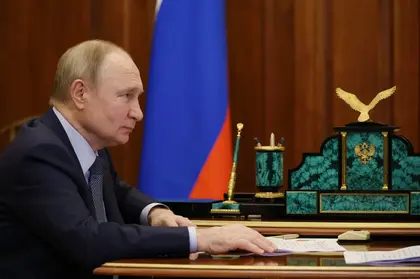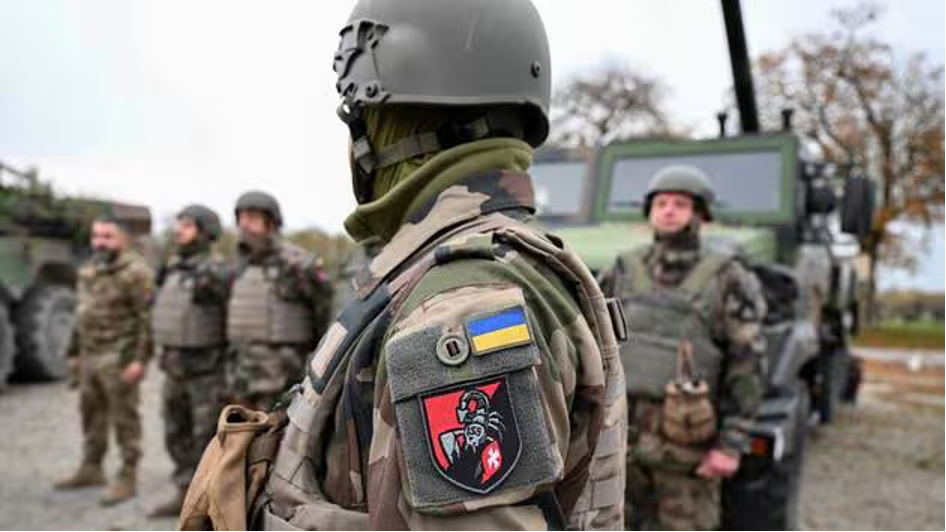The informal tribunal that took place in The Hague on Feb. 17-24, considered the crime of Russian aggression against Ukraine and the personal responsibility of Russian President Vladimir Putin. He is considered to be the individual effectively controlling and directing military action in Ukraine, being in charge of planning, preparing and waging the war against Ukraine.
The tribunal was composed of influential judges and prosecutors, from different parts of the world with expertise in international humanitarian law and crimes against humanity. Testifying for Ukraine were victims of Russian aggression and Yuriy Bilous, a lawyer who has since Mar. 4, 2022 collected and documented evidence of Russian war crimes.
The tribunal was initiated by Cinema for Peace, the international non-commercial organization founded in Berlin in 2002 by film producer Jaka Bizilj, in response to the 9.11 terrorist attacks in the United States. Bizilj organized the transfer of Russian opposition leader Alexei Navalny, from Omsk to Berlin, after he was poisoned on August 20, 2020.
The tribunal heard testimonies by witnesses to murders of innocent civilians in towns of Bucha and Hostomel and illegal detentions in the village of Kozarovychi, in the Kyiv region. Other witnesses, who survived the Russian occupation of Kherson and Berdyansk, told the tribunal that they had been detained and subjected to inhuman treatment, abuse and torture for their pro-Ukrainian position. One of the witness accounts concerned an attack on a humanitarian convoy near Chernihiv by Russian troops. Material evidence, placed before the tribunal, included photographs, satellite images, videos and independent reports from international organizations.
The tribunal examined Putin's Feb. 24, 2022 announcement of the so-called "special military operation", in the context of his presidential powers. They also scrutinized the powers of the Security Council of the Russian Federation, which on Feb. 21, 2022 recognized the so-called "Donetsk People's Republic" and "Luhansk People's Republic", as well as the powers of the Council's head Nikolai Patrushev, Defense Minister Sergei Shoigu and other top officials.
The tribunal also studied evidence, collected from different parts of Ukraine, of the conduct of Russian troops during the invasion, the reported number of refugees, and legitimacy of the invasion which Russia claimed, was undertaken "for reasons of self-defense" in accordance with Article 51 of the UN Charter. The judges concluded that Vladimir Putin was personally responsible for the war on Ukrainian territory.
JOIN US ON TELEGRAM
Follow our coverage of the war on the @Kyivpost_official.
Kyiv Post asked Yuriy Bilous for details.
Mr. Bilous, you have been collecting and documenting evidence of Russian war crimes across Ukraine since the very first days of the full-scale invasion. Whose story impressed you most of all?
It is the story of “Serhiy”, from Mariupol, who lost his dearest ones at once. It happened in March, 2022, when the city came under massive shelling. He saw Russian soldiers shoot his two daughters and ex-wife as they ran from their apartment building to a basement. His elderly mother was heavily wounded in the leg. Doctors said they would need to amputate it, but she refused. Staying in the dark and damp basement without medical care or medicines, she was getting worse and worse into agony. When it became a little quieter in their part of the city, Serhiy decided to take her outdoors to show her the sun. He put his mother in a wheelbarrow, and there she died. He buried her in the yard next to his wife and daughters. There are very many such graves in the yards of Mariupol.
There was a man from Malyn, in the Zhytomyr region, who testified at the informal tribunal. The Russians dropped a bomb right on his house, instantly killing his whole family of five: his daughter, son, wife and two thirteen months old granddaughters. There was nothing left of the house. AS he told his story, the man was crying and, on hearing it, one of the judges couldn't hold back her tears.
How open are the people who tell you about these horrors of war?
The people are quite open. It's important to them to tell their stories because they want the Russians to be punished for their crimes. My job was to compile this and other evidence of war crimes and submit it all to the Security Service and the Prosecutor General's Office, as part of preparing case files for the International Criminal Court in The Hague. I interviewed a total of 70 Ukrainians and made more than 150 video recordings that catalogue the crimes committed by Russian troops, which include murder, torture, illegal detention and many other war crimes.
Why was the informal tribunal initiated? What was the purpose?
In order to convict Putin it is necessary to establish a formal tribunal. As this has yet to be done, this informal tribunal was initiated in order to put pressure on the world community to act. While this tribunal was informal, real judges and prosecutors sat in judgement, scrutinized real evidence, heard the stories of real victims and witnesses to the crime of aggression. At the end of the tribunal the judges mad a ruling.
Who did you meet in Sweden? What were their attitudes to Ukraine? What questions did they ask?
I met Kerstin Lundgren, who is a member of the Swedish parliament, and a Swedish foreign ministry official. I felt that the Swedish people support us but still don't fully understand the breadth of horror of these war crimes. That's why it's important to reach out to them. The legal component is important here. Everybody has seen news reports from Bucha, Mariupol or Kharkiv, but they live a different life.
Interestingly, in the foreign ministry and the parliament I was asked one and the same question: "U.S. Vice President Kamala Harris has said that Russia is committing crimes against humanity in Ukraine. Is that true?" This means they still don't understand the full scale of the war crimes that Russia has committed and continues to commit. I was surprised to hear them refer to information from the U.S. as the source for understanding the fact that these crimes against humanity are really committed in Ukraine.
We have more than 70,000 recorded crimes committed by Russian troops, but they should not be considered as just single incidents they are parts of one entire story. They also asked me if Wagner mercenaries and Kadyrov’s fighters are worse than any others. My answer was that all these crimes were committed by ordinary Russian citizens, who came to our land to kill whether from Khabarovsk or Buryatia. It's important to understand that such atrocities were carried out by every type of Russian soldier. They may have been just ordinary people before the war; yesterday one was a taxi driver in Bryansk but today he murders Ukrainian children and tortures their parents in a basement.
What decision did the informal tribunal pronounce?
On February 24, the informal tribunal for Putin in The Hague pronounced the following rulings:
1. President Vladimir Putin is responsible for preparing, planning, launching and waging an aggressive war on Ukrainian territory. He exercised personal control over the political and military actions of the Russian Federation on the territory of Ukraine.
2. By the nature, gravity and scale of the aggression of the Russian Federation against Ukraine Russia is in violation of Article 2 of the UN Charter, which prohibits the use of force against the territorial integrity or political independence of any state.
3. The tribunal called upon the United Nations, the European Union, all international organizations, parliaments, politicians and all people of the world to exert maximum effort for Putin to be convicted.
The informal tribunal has sent all the documents and evidence to the relevant authorized bodies.
Based on this tribunal, Cinema for Peace will make a documentary with excerpts from the questioning of witnesses and victims of crimes committed by Russian soldiers.
What is the next step in this case?
The next step must be taken by the United Nations, governments and politicians of the world. We need to make maximum effort to establish and administer a Special Tribunal to bring the top leadership of Russia and Belarus to justice for the Crime of Aggression.
Judges in the informal tribunal:
Zak Yacoob, in 1990-2015 a judge of the Constitutional Court of the RSA (appointed by Nelson Mandela), in his younger years an active fighter against apartheid.
Stephen Rapp, a U.S. lawyer, former special envoy for war crimes at the Office of Global Criminal Justice at the U.S. Department of State.
Priya Pillai, an expert in international law who worked in the International Tribunal for Yugoslavia, has 20 years' experience in international law, human rights, transitional justice, peace and conflict, and humanitarian and criminal laws; obtained a Doctor's degree at the Geneva Graduate Institute of International and Development Studies.
Prosecutors in the informal tribunal:
Drew White, an international lawyer from Canada best known for his role in the conviction of Col. Theoneste Bagosora, who the media dubbed "the mastermind" of the 1994 Rwanda genocide and who White referred to in his closing trial submissions as one of the "enemies of the human race". Between October 2000 and December 2011, White prosecuted the trials of six accused at the International Criminal Tribunal for Rwanda, resulting in five convictions and life sentences at trial. He has experience in international investigations on Rwanda, Libya, Syria, Iraq and Afghanistan.
David Akerson dealt with international crimes as a senior legal consultant at UN tribunals for Yugoslavia, Rwanda and Lebanon as well as with a multitude of other atrocious crimes in Syria, Iraq, South Africa, Cambodia and Sierra Leone.
Tapas K. Baul, a barrister qualified in litigation, criminal and civil matters and dispute resolution, panel lawyer for the Ministry of Commerce in the government of Bangladesh, adjunct faculty member at Jahangirnagar University.
You can also highlight the text and press Ctrl + Enter



